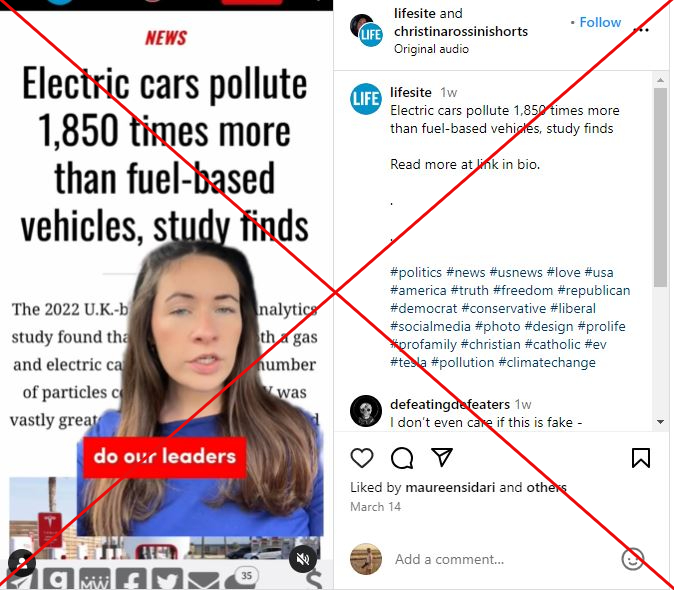As the United States aims to accelerate its shift to electric vehicles (EVs), social media users cite a report on tire emissions to claim such cars pollute significantly more than their gas-powered peers. But the posts misrepresent the analysis by omitting the effect of carbon dioxide (CO2) emitted from tailpipes — and while the environmental impact of EVs depends on how they are manufactured and charged, industry experts say they are more sustainable overall.
“According to a 2022 study, electric vehicles pollute at a rate far higher than their gasoline or diesel-powered counterparts,” says Christina Rossini, a contributor for the Catholic Canadian publication LifeSite, in a March 14, 2024 video on Instagram.
“The 2022 study from the UK-based Emissions Analytics Group found that during a 1,000 mile journey, electric vehicles release 1,850 times more pollutants into the surrounding environment than gas-powered vehicles.”
Rossini refers to a now-removed March 8 article from LifeSite, which AFP has repeatedly fact-checked for spreading misinformation.
Similar claims have circulated in other languages, including French, Czech and Romanian.
The report published by Emissions Analytics compared emissions from tire wear to those from tailpipes under “normal” driving conditions in a variety of different vehicles (archived here).
The data analysis group found “the latter is actually around 1,850 times greater than the former.”
While tailpipe emissions are falling as exhaust filters become more efficient, the report says “tire wear emissions are rising as vehicles become heavier and added power and torque is placed at the driver’s disposal.”
But Nick Molden, CEO and founder of Emissions Analytics (archived here), said the social media posts misrepresent the findings by implying the research directly compared electric and non-electric vehicles, “when the central contrast is between tailpipe and tire emissions — whatever the vehicle.”
Molden said his company did not find EVs pollute more.
“This would be a completely false conclusion, not least because of the significant CO2 emissions from the tailpipe,” he told AFP on March 21. “Tire emissions is a problem to mitigate, not a reason not to electrify.”
Simona Onori, an energy science and engineering associate professor at Stanford University (archived here), said March 22 that “tire wear pollution is a concern for all vehicles, whether they’re electric or gasoline-powered.”
Greenhouse gas emissions
Multiple independent experts told AFP that EVs have a smaller environmental impact than gas-powered cars.
EVs tend to be heavier than other cars due to the weight of the battery. That accelerates tire wear and leads to more emissions, Onori said.
However, the difference is relatively small compared to other sources of pollution in the transportation sector, such as tailpipe emissions.
“If we are talking about climate change, (tire wear) emissions are largely beside the point,” said Dennis Wamsted, an energy analyst at the Institute for Energy Economics and Financial Analysis (archived here). “Electric vehicles are much cleaner than gas/diesel powered cars when talking about greenhouse gas emissions.”
An analysis from the International Council on Clean Transportation (archived here) indicates EVs in the United States create up to 68 percent fewer greenhouse gas emissions over the course of their life cycle — from production to disposal — than gas-powered cars, despite the fact that the power grid is still reliant on fossil fuels (archived here).
The Biden administration announced March 20 revised pollution standards for cars and trucks meant to accelerate the US auto industry’s shift to electric, with the goal of having 50 percent of new vehicles be EVs by 2030.

Corin FAIFESabrina BLANCHARDAFP
Experts say EVs will become cleaner as the energy sector shifts toward sustainable sources and batteries become more efficient.
A report from the Intergovernmental Panel on Climate Change says that when powered with low-carbon electricity, EVs “provide a mechanism for major GHG emissions reductions from the largest sources in the transport sectors, including cars” (archived here).
Jeremy Michalek, an engineering and public policy professor at Carnegie Mellon University (archived here), emphasized the importance of moving “the vehicle sector and the power sector in parallel.”
He said the pollution from EVs driven in the US Eastern PJM region (archived here) — a grid that includes parts or all of 13 US states and the District of Columbia — is estimated to be “roughly comparable (to gas-powered cars)” (archived here).
In contrast, an EV driven in the state of California, which accounts for about 37 percent of nationwide registrations (archived here), will be greener because coal represents just slightly more than two percent of the power mix (archived here).
“EVs are one of only a few ways where it is even possible to provide personal transportation with near-zero emissions,” Michalek said. “So in the long run, moving forward on the transition is important — even if they are not yet providing major emissions reductions in some regions.”
The US-based Union of Concerned Scientists offers a tool to help consumers estimate the emissions of a traditional car compared to those of a hybrid or fully electric vehicle in their area.
AFP has previously investigated other misleading claims about EVs.
